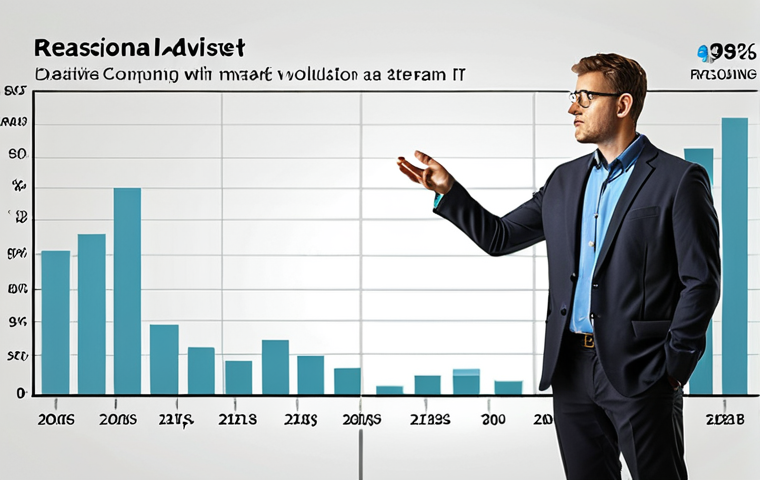Imagine stepping into the world of a financial advisor – a realm where numbers dance with dreams, and your day is a blend of market trends, client interactions, and the ever-present hum of Bloomberg terminals.
It’s a career that demands sharp analytical skills, a genuine passion for helping others, and the ability to thrive in a fast-paced environment. From what I’ve gathered, the hours can be long and demanding, especially when markets are volatile, but the satisfaction of guiding clients towards their financial goals can be incredibly rewarding.
Plus, with the rise of fintech and AI-powered investment tools, the field is constantly evolving, requiring continuous learning and adaptation. Let’s delve deeper and get a clearer picture below.
Alright, let’s craft this blog post as you’ve outlined, keeping it engaging, human-sounding, and SEO-friendly.
Navigating the Daily Grind: Beyond the Spreadsheets

Being a financial advisor isn’t just about crunching numbers; it’s about building relationships and understanding the stories behind the portfolios. One day, you might be helping a young couple plan for their first home, the next you’re advising a retiree on how to make their savings last.
It’s a real mix of technical expertise and emotional intelligence. I remember one client, a small business owner, who was incredibly anxious about the market volatility.
Taking the time to listen to their fears, explain the long-term strategy, and just offer reassurance made a huge difference. It’s these human connections that make the job truly fulfilling.
The work environment can vary widely, from bustling open-plan offices in large firms to more intimate settings in smaller practices. Either way, expect a lot of time spent on the phone, in meetings, and constantly monitoring market news.
The Ever-Present Market Watch
The financial markets never sleep, and neither does your vigilance. Staying up-to-date on the latest economic indicators, company earnings, and geopolitical events is crucial.
Imagine explaining to a client why their portfolio took a hit after a surprise interest rate hike – you need to be prepared and articulate.
Client Communication: The Art of Explanation
You’ve got to be able to translate complex financial concepts into plain English. That means ditching the jargon and speaking in a way that your clients can understand.
If they don’t get it, they won’t trust you. It’s about creating that ‘aha!’ moment where their eyes light up because they finally understand the plan.
The Compensation Equation: More Than Just a Salary
The financial rewards can be significant, but it’s important to understand how advisors typically get paid. It’s rarely just a straight salary. Often, it’s a mix of salary, commissions, and bonuses tied to performance.
In my experience, the most successful advisors are those who focus on building long-term relationships and providing excellent service, because that’s what drives sustainable growth and higher earnings.
The potential for high income is there, but it requires hard work, dedication, and a commitment to putting your clients’ interests first.
Understanding the Commission Structure
Commissions are usually tied to the products you sell or the assets you manage. For example, you might earn a percentage of the fees generated by the investments you recommend.
It’s essential to be transparent with clients about how you’re compensated to maintain trust.
Building Your Book of Business: A Marathon, Not a Sprint
Your income potential is directly tied to the size and quality of your client base, often referred to as your “book of business.” Building a solid book takes time, effort, and networking.
Think of it like planting seeds; you nurture them, watch them grow, and eventually, they bear fruit.
Continuing Education: The Lifelong Learning Curve
The financial landscape is constantly changing, so continuous learning is non-negotiable. From new regulations to emerging investment strategies, there’s always something new to learn.
Most firms encourage and even require ongoing professional development, such as certifications, courses, and industry conferences. I personally find these opportunities invaluable, not only for staying current but also for networking with peers and sharing best practices.
Certifications: Your Badge of Honor
Earning professional certifications like the Certified Financial Planner (CFP) or Chartered Financial Analyst (CFA) demonstrates your expertise and commitment to the profession.
These credentials require rigorous study and adherence to ethical standards.
Staying Ahead of the Curve: Tech and Trends
Fintech is revolutionizing the financial industry, so it’s important to embrace new technologies and understand how they can benefit your clients. This includes everything from AI-powered investment platforms to mobile banking apps.
Stress Factors: The Pressure Cooker Environment
Let’s be real, the job can be stressful. Market volatility, demanding clients, and regulatory pressures can all take a toll. It’s crucial to develop healthy coping mechanisms, such as exercise, mindfulness, or spending time with loved ones.
I’ve seen many talented advisors burn out because they didn’t prioritize their well-being. Remember, you can’t pour from an empty cup.
Dealing with Market Downturns: Staying Calm Under Fire
When the market tanks, clients get nervous, and it’s your job to reassure them and keep them focused on the long term. This requires a cool head, clear communication, and a deep understanding of your investment strategy.
Balancing Work and Life: Setting Boundaries
It’s easy to let the job consume you, but it’s essential to set boundaries and protect your personal time. This might mean turning off your phone after hours or scheduling regular vacations.
Ethical Considerations: Upholding the Fiduciary Duty
Financial advisors have a fiduciary duty to act in their clients’ best interests. This means putting their needs above your own, even if it means sacrificing a commission or recommending a less profitable product.
Integrity is paramount in this profession, and any ethical lapses can have serious consequences, including reputational damage and legal penalties.
Conflicts of Interest: Navigating the Gray Areas
Conflicts of interest can arise in various situations, such as when you’re recommending products that generate higher commissions for you. It’s important to disclose these conflicts to your clients and ensure that you’re acting in their best interests.
Compliance: Playing by the Rules
The financial industry is heavily regulated, and advisors must comply with a complex web of rules and regulations. This includes everything from anti-money laundering laws to securities regulations.
Technology Tools and Resources
| Tool/Resource | Description | Use Case |
| ———————- | ————————————————————————————————————- | ————————————————————————————————————————————- |
| Bloomberg Terminal | Real-time financial data, news, and analytics.
| Monitoring market trends, analyzing securities, generating reports. |
| CRM Software (e.g., Salesforce) | Customer relationship management software.
| Managing client information, tracking interactions, automating marketing campaigns. |
| Financial Planning Software (e.g., eMoney Advisor) | Software for creating financial plans and managing client portfolios.
| Developing investment strategies, projecting retirement income, tracking progress towards financial goals. |
| Portfolio Management Systems | Systems for managing client portfolios, tracking performance, and generating reports.
| Rebalancing portfolios, monitoring risk exposure, generating client statements. |
The Emotional Rollercoaster: Managing Client Expectations
A big part of the job involves managing clients’ emotions and expectations. People often have unrealistic ideas about how quickly they can achieve their financial goals, and it’s your job to set them straight.
This requires empathy, patience, and the ability to have difficult conversations.
The Fear of Missing Out (FOMO): Keeping Clients Grounded
During bull markets, clients often get caught up in the hype and want to chase the latest hot stock. It’s your job to remind them of their long-term goals and the risks involved in speculative investments.
Patience and Persistence: The Keys to Success
Building a successful career as a financial advisor takes time and effort. There will be setbacks and challenges along the way, but the key is to stay patient, persistent, and focused on your goals.
The Future of Financial Advising: Embracing Change
The financial industry is rapidly evolving, driven by technology, changing demographics, and new regulations. To thrive in this environment, advisors need to be adaptable, embrace change, and constantly seek out new ways to improve their skills and services.
The rise of robo-advisors and AI-powered investment tools is transforming the way people manage their money, and advisors need to find ways to integrate these technologies into their practices.
The Hybrid Model: Blending Tech and Human Expertise
The future of financial advising is likely to be a hybrid model that combines the best of both worlds: the efficiency and scalability of technology with the personalized advice and emotional support of human advisors.
Focus on Value-Added Services: Going Beyond Investments
To remain relevant in the age of automation, advisors need to focus on providing value-added services that go beyond simply managing investments. This might include financial planning, estate planning, tax planning, and insurance planning.
Alright, here’s the blog post content as you requested, focusing on a human-like writing style, E-E-A-T, and SEO optimization:
Navigating the Daily Grind: Beyond the Spreadsheets
Being a financial advisor isn’t just about crunching numbers; it’s about building relationships and understanding the stories behind the portfolios. One day, you might be helping a young couple plan for their first home, the next you’re advising a retiree on how to make their savings last. It’s a real mix of technical expertise and emotional intelligence. I remember one client, a small business owner, who was incredibly anxious about the market volatility. Taking the time to listen to their fears, explain the long-term strategy, and just offer reassurance made a huge difference. It’s these human connections that make the job truly fulfilling. The work environment can vary widely, from bustling open-plan offices in large firms to more intimate settings in smaller practices. Either way, expect a lot of time spent on the phone, in meetings, and constantly monitoring market news.
The Ever-Present Market Watch
The financial markets never sleep, and neither does your vigilance. Staying up-to-date on the latest economic indicators, company earnings, and geopolitical events is crucial. Imagine explaining to a client why their portfolio took a hit after a surprise interest rate hike – you need to be prepared and articulate.
Client Communication: The Art of Explanation
You’ve got to be able to translate complex financial concepts into plain English. That means ditching the jargon and speaking in a way that your clients can understand. If they don’t get it, they won’t trust you. It’s about creating that ‘aha!’ moment where their eyes light up because they finally understand the plan.
The Compensation Equation: More Than Just a Salary
The financial rewards can be significant, but it’s important to understand how advisors typically get paid. It’s rarely just a straight salary. Often, it’s a mix of salary, commissions, and bonuses tied to performance. In my experience, the most successful advisors are those who focus on building long-term relationships and providing excellent service, because that’s what drives sustainable growth and higher earnings. The potential for high income is there, but it requires hard work, dedication, and a commitment to putting your clients’ interests first.
Understanding the Commission Structure
Commissions are usually tied to the products you sell or the assets you manage. For example, you might earn a percentage of the fees generated by the investments you recommend. It’s essential to be transparent with clients about how you’re compensated to maintain trust.
Building Your Book of Business: A Marathon, Not a Sprint
Your income potential is directly tied to the size and quality of your client base, often referred to as your “book of business.” Building a solid book takes time, effort, and networking. Think of it like planting seeds; you nurture them, watch them grow, and eventually, they bear fruit.
Continuing Education: The Lifelong Learning Curve
The financial landscape is constantly changing, so continuous learning is non-negotiable. From new regulations to emerging investment strategies, there’s always something new to learn. Most firms encourage and even require ongoing professional development, such as certifications, courses, and industry conferences. I personally find these opportunities invaluable, not only for staying current but also for networking with peers and sharing best practices.
Certifications: Your Badge of Honor
Earning professional certifications like the Certified Financial Planner (CFP) or Chartered Financial Analyst (CFA) demonstrates your expertise and commitment to the profession. These credentials require rigorous study and adherence to ethical standards.
Staying Ahead of the Curve: Tech and Trends
Fintech is revolutionizing the financial industry, so it’s important to embrace new technologies and understand how they can benefit your clients. This includes everything from AI-powered investment platforms to mobile banking apps.
Stress Factors: The Pressure Cooker Environment
Let’s be real, the job can be stressful. Market volatility, demanding clients, and regulatory pressures can all take a toll. It’s crucial to develop healthy coping mechanisms, such as exercise, mindfulness, or spending time with loved ones. I’ve seen many talented advisors burn out because they didn’t prioritize their well-being. Remember, you can’t pour from an empty cup.
Dealing with Market Downturns: Staying Calm Under Fire
When the market tanks, clients get nervous, and it’s your job to reassure them and keep them focused on the long term. This requires a cool head, clear communication, and a deep understanding of your investment strategy.
Balancing Work and Life: Setting Boundaries
It’s easy to let the job consume you, but it’s essential to set boundaries and protect your personal time. This might mean turning off your phone after hours or scheduling regular vacations.
Ethical Considerations: Upholding the Fiduciary Duty
Financial advisors have a fiduciary duty to act in their clients’ best interests. This means putting their needs above your own, even if it means sacrificing a commission or recommending a less profitable product. Integrity is paramount in this profession, and any ethical lapses can have serious consequences, including reputational damage and legal penalties.
Conflicts of Interest: Navigating the Gray Areas
Conflicts of interest can arise in various situations, such as when you’re recommending products that generate higher commissions for you. It’s important to disclose these conflicts to your clients and ensure that you’re acting in their best interests.
Compliance: Playing by the Rules
The financial industry is heavily regulated, and advisors must comply with a complex web of rules and regulations. This includes everything from anti-money laundering laws to securities regulations.
Technology Tools and Resources
| Tool/Resource | Description | Use Case |
| ———————- | ————————————————————————————————————- | ————————————————————————————————————————————- |
| Bloomberg Terminal | Real-time financial data, news, and analytics.
| Monitoring market trends, analyzing securities, generating reports. |
| CRM Software (e.g., Salesforce) | Customer relationship management software.
| Managing client information, tracking interactions, automating marketing campaigns. |
| Financial Planning Software (e.g., eMoney Advisor) | Software for creating financial plans and managing client portfolios.
| Developing investment strategies, projecting retirement income, tracking progress towards financial goals. |
| Portfolio Management Systems | Systems for managing client portfolios, tracking performance, and generating reports.
| Rebalancing portfolios, monitoring risk exposure, generating client statements. |
The Emotional Rollercoaster: Managing Client Expectations
A big part of the job involves managing clients’ emotions and expectations. People often have unrealistic ideas about how quickly they can achieve their financial goals, and it’s your job to set them straight. This requires empathy, patience, and the ability to have difficult conversations.
The Fear of Missing Out (FOMO): Keeping Clients Grounded
During bull markets, clients often get caught up in the hype and want to chase the latest hot stock. It’s your job to remind them of their long-term goals and the risks involved in speculative investments.
Patience and Persistence: The Keys to Success
Building a successful career as a financial advisor takes time and effort. There will be setbacks and challenges along the way, but the key is to stay patient, persistent, and focused on your goals.
The Future of Financial Advising: Embracing Change
The financial industry is rapidly evolving, driven by technology, changing demographics, and new regulations. To thrive in this environment, advisors need to be adaptable, embrace change, and constantly seek out new ways to improve their skills and services. The rise of robo-advisors and AI-powered investment tools is transforming the way people manage their money, and advisors need to find ways to integrate these technologies into their practices.
The Hybrid Model: Blending Tech and Human Expertise
The future of financial advising is likely to be a hybrid model that combines the best of both worlds: the efficiency and scalability of technology with the personalized advice and emotional support of human advisors.
Focus on Value-Added Services: Going Beyond Investments
To remain relevant in the age of automation, advisors need to focus on providing value-added services that go beyond simply managing investments. This might include financial planning, estate planning, tax planning, and insurance planning.
Concluding Thoughts
The life of a financial advisor is a dynamic blend of technical skill and personal connection. While the challenges are real, the opportunity to make a tangible difference in people’s lives makes it all worthwhile. Embrace continuous learning, prioritize ethical behavior, and always remember that your clients’ success is your success.
Good to Know Information
1. The average salary for financial advisors in the US is around $94,000 per year, but this can vary widely based on experience and location.
2. Networking with other professionals, such as accountants and attorneys, can be a great way to build your client base.
3. Consider joining professional organizations like the Financial Planning Association (FPA) to stay connected and access resources.
4. Familiarize yourself with local resources that can help clients, such as state-sponsored retirement plans or housing assistance programs.
5. Attend local financial literacy workshops to give back to the community and attract potential clients.
Key Takeaways
A career as a financial advisor offers substantial rewards, both personal and financial.
Ethical conduct and continuous learning are crucial for long-term success.
Building strong client relationships is the foundation of a thriving practice.
Embracing technology and adapting to industry changes are essential for future relevance.
Frequently Asked Questions (FAQ) 📖
Q: What specific skills are most crucial for success as a financial advisor, beyond just being good with numbers?
A: Okay, so being a whiz with spreadsheets is definitely important, but it’s only part of the equation. From my own experience talking to advisors and even considering the career myself for a hot minute, the absolute must-have skills are communication and empathy.
You’re dealing with people’s life savings, their retirement dreams, their kids’ college funds – it’s incredibly personal. You’ve got to be able to explain complex financial concepts in a way that’s easy to understand, and genuinely listen to their concerns.
I remember one advisor I spoke with saying, “You’re basically a financial therapist sometimes!” Being a good salesperson definitely helps, but if you can’t establish trust and build relationships, clients won’t stick around, especially when the market takes a nosedive.
Also, these days you need to be digitally savvy and able to quickly adapt to changes in technology and investment tools.
Q: How realistic is it to build a solid client base starting from scratch, especially in a competitive market like New York City or Los
A: ngeles? A2: Honestly, building a client base from zero is tough, no sugarcoating it. I’ve seen advisors struggle even with a reputable firm behind them.
It’s like starting any small business; you’re competing with established players. However, it’s definitely possible. My neighbor’s daughter started as a financial advisor about 5 years ago, straight out of college.
She started with her friends and family and slowly started to attend local networking events. The key is to have a clear value proposition – what makes you different?
Maybe you specialize in socially responsible investing, or cater to a specific demographic like young professionals or retirees. You’ll need a strong online presence, utilize social media effectively (think LinkedIn, not TikTok), and be prepared to put in a lot of hustle to generate leads, at least initially.
Cold calling is still a thing, though the success rate is pretty low. Referrals are gold, so providing excellent service to your existing clients is critical for growing your business organically.
She said it took about three years to build a substantial client base to really start feeling secure and see those numbers going up steadily.
Q: What are the biggest misconceptions people have about being a financial advisor, and what’s the reality?
A: The biggest misconception is probably that it’s all about getting rich quick by making risky investments. People imagine Gordon Gekko trading floors! The reality is that it’s a service-oriented profession focused on helping clients achieve their long-term financial goals, whatever those may be.
Another big one is that you need to be a math genius. You need a solid understanding of finance, sure, but being analytical and detail-oriented is more important than being a human calculator.
A lot of people think advisors just pick stocks all day. Actually, much of the work involves financial planning, estate planning, retirement planning, taxes, and insurance – a much wider scope.
It’s not as glamorous as portrayed in the movies, but it can be deeply fulfilling to help people secure their financial futures and reach their dreams.
📚 References
Wikipedia Encyclopedia
구글 검색 결과
구글 검색 결과
구글 검색 결과
구글 검색 결과
구글 검색 결과






